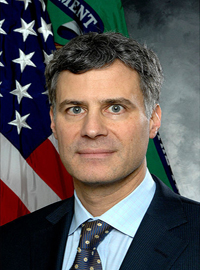| New White House Advisor Politicizes Economics |
 |
|
By Ashton Ellis
Friday, September 02 2011 |
The liberal politicization of economics continues unabated with President Barack Obama’s nomination of a labor economist to chair his Council of Economic Advisors (CEA). A look at the nominee’s record shows that his expertise is promoting liberal policies using economic language, not job creation. Alan Krueger, a Princeton University economist, is reputed to be “one of the preeminent labor economists” in America. But if that’s so, it’s only because Krueger consistently wraps liberal policies inside economic-sounding language. Krueger’s previous stint in government was as the chief economic advisor to Treasury Secretary Timothy Geithner. In that post, Krueger helped midwife the “cash for clunkers” program that ran from July through August of 2009. It was billed as a way to spur auto sales by giving cash payments to people for junking working cars. The program was a bust. Not only did it shrink the supply of used cars, thus raising the price of pre-owned vehicles, Edmunds.com, an auto industry analysis firm, estimated that only 18 percent of the vehicles sold to program participants represented new sales. The other 82 percent would have occurred even without the government subsidy. Cost to the taxpayer: $24,000 per car. Talk about a clunker. But what Krueger and other Obama Administration officials failed to mention then and now is that cash-for-clunkers was not an economic stimulus program at all, but a step toward achieving a key goal of the environmental left. Since the cost of hybrids has so far failed to match their value to most consumers, cash-for-clunkers was a way to induce people to scrap un-green cars. The result was a reduction in the supply of cars environmentalists hate, but sold as a way to grow the economy. Edmunds’ CEO Jeremy Anwyl summarized the program as “less effective from an environmental standpoint and not effective from an economic perspective,” because “it tried to do too many things.” Good thing for Krueger that President Obama isn’t using an economic measuring stick when evaluating his effectiveness. Sadly, there’s more. In between working at Treasury and his nomination to head CEA, Krueger wrote a blog post for the New York Times suggesting that a national sales tax be adopted, but not go into effect for two years. The result, according to Krueger, would “help jump-start spending in the economy and thereby increase production and employment.” However, Krueger admits that “the main downside of this proposal is that taxes reduce economic activity.” But at least Americans will have a massive new tax! Krueger’s tax strategy isn’t bad for an economist trying to ingratiate himself to the Unemployment President, but it is a terrible idea for ginning up the economy before saddling it with a huge tax increase. Other entries on Krueger’s greatest (mis)hits list include arguing against the common sense and easily proved theory that raising the minimum wage reduces minimum wage jobs. He said in testimony before Congress that imposing a cap-and-trade tax system would create “new industries and jobs.” He also testified that eliminating the tax credits for oil and gas production – while retaining all other manufacturing credits – would reduce the overproduction of fossil fuels in America. (Only a liberal could argue that we’re producing too much domestic oil and gas.) Again and again, Krueger has shown his true interest is not in fostering real economic growth, but in providing a rationale for implementing liberal policies. After a crisis of over-consumption helped plunge America into deficits at all levels – from the feds to millions of families – the last thing the government needs to do is frighten people into spending money. If Krueger were truly interested in growing the economy, he would be advocating tax cuts on profits, income and investments. Of course, if Krueger did that, he would not be next-in-line to make Obama’s job-killing liberal agenda sound economically plausible. |
Related Articles : |
























